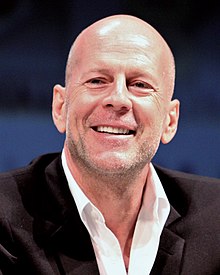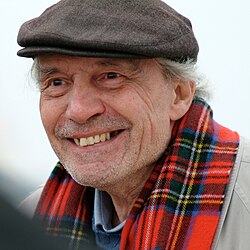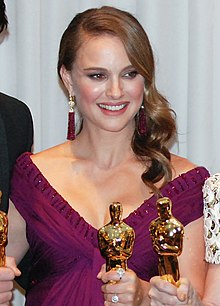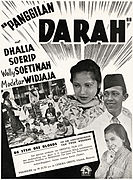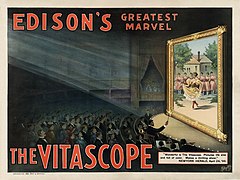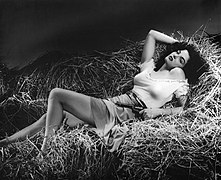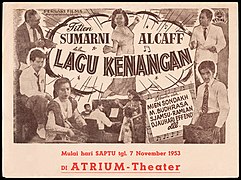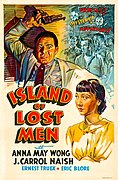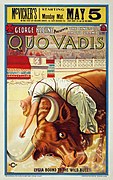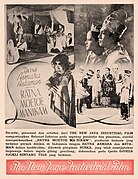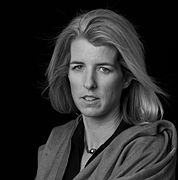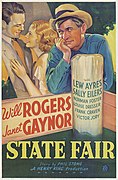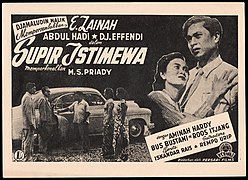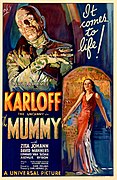Portal:Film
The Film Portal
 A film (British English) – also called a movie (American English), motion picture, moving picture, picture, photoplay or (slang) flick – is a work of visual art that simulates experiences and otherwise communicates ideas, stories, perceptions, feelings, beauty, or atmosphere through the use of moving images. These images are generally accompanied by sound and, more rarely, other sensory stimulations. The word "cinema", short for cinematography, is often used to refer to filmmaking and the film industry, and the art form that is the result of it. (Full article...)
A film (British English) – also called a movie (American English), motion picture, moving picture, picture, photoplay or (slang) flick – is a work of visual art that simulates experiences and otherwise communicates ideas, stories, perceptions, feelings, beauty, or atmosphere through the use of moving images. These images are generally accompanied by sound and, more rarely, other sensory stimulations. The word "cinema", short for cinematography, is often used to refer to filmmaking and the film industry, and the art form that is the result of it. (Full article...)
Featured articles -
Made in Dagenham is a 2010 British comedy-drama film directed by Nigel Cole, written by William Ivory, and starring Sally Hawkins, Bob Hoskins, Miranda Richardson, Geraldine James, Rosamund Pike, Andrea Riseborough, Jaime Winstone, Daniel Mays and Richard Schiff. It dramatises the Ford sewing machinists strike of 1968 that aimed for equal pay for women. Its theme song, with lyrics by Billy Bragg, is performed by Sandie Shaw, a native of the area and former Ford Dagenham clerk.
A stage musical version of the film opened at London's Adelphi Theatre in 2014. (Portal:Film/Featured content)
General images -
Selected image

Ingmar Bergman, taken during production of Wild Strawberries (1957). Bergman was a Swedish film, stage, and opera director. He found bleakness and despair as well as comedy and hope in his explorations of the human condition. He is recognized as one of the greatest and most influential filmmakers of modern cinema.
Did you know...
- ... that none of the actors in Poppy Garden, a film depicting a father and son's struggle for survival during the Colombian conflict, had previously acted in a film?
- ... that the 2023 drama film Fly Me to the Moon was Sasha Chuk's debut as a director, screenwriter and lead actress, making it her first feature film in all three categories?
- ... that episodes of such game shows as Double Dare, Finders Keepers, and You Bet Your Life were filmed at the Philadelphia studios of a public TV station?
- ... that the May Queen dress worn by Florence Pugh in the film Midsommar was made of 10,000 silk flowers and reportedly sold for US$65,000 at auction?
- ... that an Irish comedy group wrote the film Apocalypse Clown?
Selected biography -
Laurence Kerr Olivier, Baron Olivier, OM (/ˈlɒrəns ˈkɜːr əˈlɪvieɪ/; 22 May 1907 – 11 July 1989) was an English actor and director who, along with his contemporaries Ralph Richardson and John Gielgud, was one of a trio of male actors who dominated the British stage of the mid-20th century. He also worked in films throughout his career, playing more than fifty cinema roles. Late in his career he had considerable success in television roles.
Olivier's family had no theatrical connections, but his father, a clergyman, decided that his son should become an actor. After attending a drama school in London, Olivier learned his craft in a succession of acting jobs during the late 1920s. In 1930 he had his first important West End success in Noël Coward's Private Lives, and he appeared in his first film. In 1935 he played in a celebrated production of Romeo and Juliet alongside Gielgud and Peggy Ashcroft, and by the end of the decade he was an established star. In the 1940s, together with Richardson and John Burrell, Olivier was the co-director of the Old Vic, building it into a highly respected company. There his most celebrated roles included Shakespeare's Richard III and Sophocles's Oedipus. In the 1950s Olivier was an independent actor-manager, but his stage career was in the doldrums until he joined the avant-garde English Stage Company in 1957 to play the title role in The Entertainer, a part he later played on film. From 1963 to 1973 he was the founding director of Britain's National Theatre, running a resident company that fostered many future stars. His own parts there included the title role in Othello (1965), and Shylock in The Merchant of Venice (1970). (Full article...)Featured lists -
News
- September 2: Tributes paid to recently deceased US actor Chadwick Boseman
- October 7: Mockumentary Mister America has world premiere
- May 16: Actor Doris Day dies at 97
- January 22: Former U.S. intelligence agent Tony Mendez, architect of 'Argo' rescue, dies at 78
- Upcoming events
WikiProjects
Selected quote
Main topics
| Filmmaking |
|---|
 |
| Glossary |
- Terms - Animation • Beta movement • Camera • Cult film • Digital cinema • Documentary film • Dubbing • Experimental film • Fan film • Film crew • Film criticism • Film festival • Film frame • Film genre • Film journals and magazines • Film industry • Film manifesto • Film stock • Film theory • Filmmaking • History of film • Independent film • Lost film • Movie star • Narrative film • Open content film • Persistence of vision • Photographic film • Propaganda • Recording medium • Special effect • Subtitles • Sound stage • Web film • World cinema
- Lists - List of basic film topics • List of film topics • List of films • List of film festivals • List of film formats • List of film series • List of film techniques • List of highest-grossing films • List of longest films by running time • List of songs based on a film or book • Lists of film source material • List of open content films
Featured content
Extended content
| ||
|---|---|---|
Featured articles
Featured lists
Featured topics
Good topics
Featured pictures
Featured portals
|
The time allocated for running scripts has expired.

The time allocated for running scripts has expired. The time allocated for running scripts has expired.
The time allocated for running scripts has expired. The time allocated for running scripts has expired.
The time allocated for running scripts has expired.

- Add The time allocated for running scripts has expired. to the See also section of film-related articles.
- Tag the talk pages of film related articles with the {{WikiProject Film}} banner.
- Explore the list of English language films without an article
- Check tasks and announcements at WPFILM Announcements.
- Collaborate with other participants at Wikipedia:WikiProject Film.
- Join one of the task forces at Wikipedia:WikiProject Film/Sidebar.
The time allocated for running scripts has expired.
The following Wikimedia Foundation sister projects provide more on this subject:
-
Commons
Free media repository -
Wikibooks
Free textbooks and manuals -
Wikidata
Free knowledge base -
Wikinews
Free-content news -
Wikiquote
Collection of quotations -
Wikisource
Free-content library -
Wikiversity
Free learning tools -
Wiktionary
Dictionary and thesaurus






















![Image 22Louis Poyet [fr]'s engraving of the mechanism of the "fusil photographique" as published in La Nature (april 1882) (from History of film technology)](http://upload.wikimedia.org/wikipedia/commons/thumb/f/f0/Fusil_photographique_Marey2.png/120px-Fusil_photographique_Marey2.png)



























